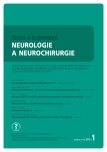-
Medical journals
- Career
T1 radiculopathy due to massive disc herniation at T1/2
Authors: I. Štětkářová
Authors‘ workplace: Neurologická klinika 3. LF UK a FN Královské Vinohrady, Praha
Published in: Cesk Slov Neurol N 2018; 81(1): 103-104
Category: Letter to Editor
doi: https://doi.org/10.14735/amcsnn2018103Overview
The author declares she has no potential conflicts of interest concerning drugs, products, or services used in the study.
The Editorial Board declares that the manuscript met the ICMJE “uniform requirements” for biomedical papers.
Sources
1. Davies P, Kaar G. High thoracic disc prolapse in a rugby player. Br J Sports Med 1993; 27(3): 177 – 178.
2. Stetkarova I, Chrobok J, Ehler E et al. Segmental abdominal wall paresis caused by lateral low thoracic disc herniation. Spine (Phila Pa 1976) 2007; 32(22): E635 – E639.
3. Singounas EG, Kypriades EM, Kellerman AJ et al. Thoracic disc herniation. Analysis of 14 cases and review of the literature. Acta Neurochir (Wien) 1992; 116(1): 49 – 52.
4. Kovalová I, Bednařík J, Keřkovský M et al. Asymptomatická spondylogenní komprese krční míchy. Cesk Slov Neurol N 2015; 78/ 111(1): 24 – 33.
5. Alberico AM, Sahni KS, Hall JA Jr et al. High thoracic disc herniation. Neurosurgery 1986; 19(3): 449 – 451.
6. Radecki J, Feinberg JH, Zimmer ZR. T1 radiculopathy: electrodiagnostic evaluation. HSS J 2009; 5(1): 73 – 77. doi: 10.1007/ s11420-008-9105-4.
7. Spacey K, Zaidan A, Khazim R et al. Horner‘s syndrome secondary to intervertebral disc herniation at the level of T1 – 2. BMJ Case Rep 2014; pii: bcr2014204820. doi: 10.1136/ bcr-2014-204820.
8. Son ES, Lee SH, Park SY et al. Surgical treatment of t1-2 disc herniation with t1 radiculopathy: a case report with review of the literature. Asian Spine J 2012; 6(3): 199 – 202. doi: 10.4184/ asj.2012.6.3.199.
Labels
Paediatric neurology Neurosurgery Neurology
Article was published inCzech and Slovak Neurology and Neurosurgery

2018 Issue 1-
All articles in this issue
- Injury as a cause of extrapyramidal syndrome
- Injury as a cause of extrapyramidal syndromes
- Injury as a cause of extrapyramidal syndromes Comment on controversies
- Olfactory groove meningiomas – surgical treatment, surgical risks and sense of smell preservation
- Neuropalliative and rehabilitative care in patients with an advanced stage of progressive neurological diseases
- Protective factors for cognitive impairment in multiple sclerosis
- Assessment of cognitive functions using short repeatable neuropsychological batteries
- Test of gestures (TEGEST) for a brief examination of episodic memory in mild cognitive impairment
- The importance of morphological and clinical classifications of lumbar spine stenosis in the preoperative planning
- Parosmia and phantosmia in patients with olfactory dysfunction
- SCN1A mutation positive Dravet syndrome, genetic aspects and clinical experiences
- Sentence comprehension in Slovak-speaking patients with Parkinson disease
- The pilot study of effect of outpatient functional electrical stimulation of peroneal nerve
- A neurological view on spondylodiscitis
- Statins and their effects on the peripheral nervous system
- Cavernous sinus thrombosis – still occurring complication of rhinosinusitis
- T1 radiculopathy due to massive disc herniation at T1/2
- Neuropathological post-mortem examination of the brain and the spinal cord in ten key points – What can a neurologist expect from the neuropathologist’s confirmation of the clinical diagnosis in neurodegenerative diseases?
- Long-term follow up of a patient with primary cervical spinal cord meningeal melanocytoma
- Neurosurgical resident training in the Czech Republic
- Alternative forms parallel to the Czech versions of Rey Auditory Verbal Learning Test, Complex Figure Test and Verbal Fluency
- Leiomyoma of the palm
- Dural-based posterior fossa giant cavernous hemangioma masquerading as hemangiopericytoma
- Czech and Slovak Neurology and Neurosurgery
- Journal archive
- Current issue
- Online only
- About the journal
Most read in this issue- A neurological view on spondylodiscitis
- Parosmia and phantosmia in patients with olfactory dysfunction
- Assessment of cognitive functions using short repeatable neuropsychological batteries
- Cavernous sinus thrombosis – still occurring complication of rhinosinusitis
Login#ADS_BOTTOM_SCRIPTS#Forgotten passwordEnter the email address that you registered with. We will send you instructions on how to set a new password.
- Career

